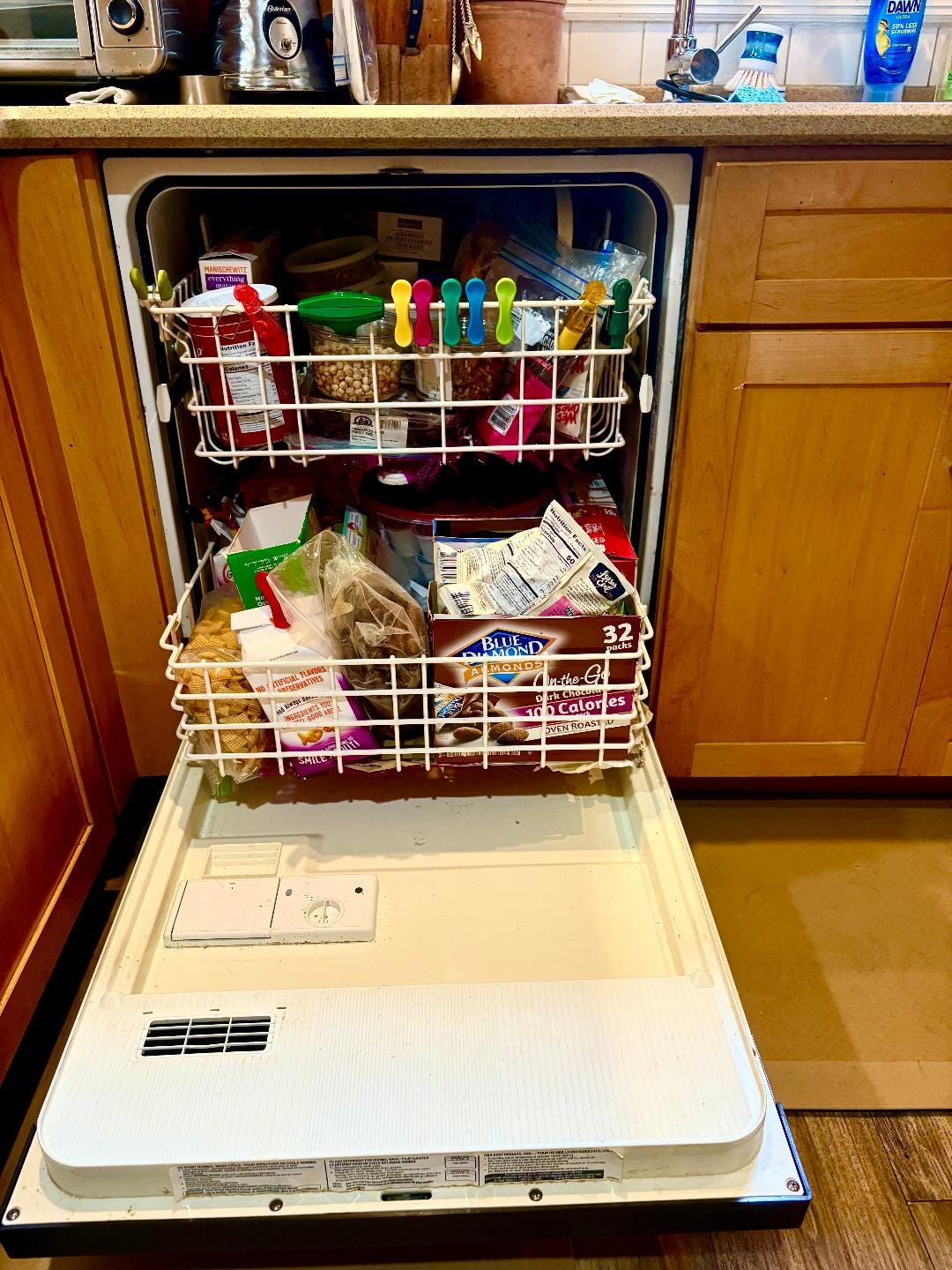QUIDDITY 92
It Became More Than That; Meanderings, Hypatia's Bookroom
It Became More than That
From the time she was 15 until her passing, writing was an ever-present influencer in Leah Napolin’s life. Writing provided her with the platform to observe and comment on the events and people that were consequential in her world, - from the minute to the universal, from YENTL to THE DOGS OF PRYPIAT. Future issues of QUIDDITY will provide you with the opportunity to become familiar with some of her insights. **********
Babes Behind Bars
by Leah Napolin
(Note: Ohio Reformatory for Women (ORW) The Ohio Reformatory for Women was opened on September 1, 1916 with a population of 34 inmates. As of July 2019, 2,394 female inmates were living at the prison ranging from minimum-security inmates all the way up to one inmate on death row. It was the fifth prison in the United States, in modern times, to open a nursery for imprisoned mothers and their babies located within the institution.)
Decades have passed, but Leah’s narrative serves as an example of Shakespeare’s line from The Tempest “The past is prologue.”
As you drive between the squat gray pillars marking the entrance gate you get the impression from across fields of corn that you're approaching a rural cloister. In the distance you see a sprawl of low buildings, the largest a formal structure dating back to the early years of the century. If it were not for the absence of any compelling scenic attractions it might be a resort hotel, and the smaller red brick buildings around it guest cottages. A little behind and to one side of the administration building, and easily missed at first because it stands sheltered behind tall shade trees, is a rambling frame house surrounded by well-kept flower beds. In the foreground are green lawns, a playing field, and a modern one-story school building with gymnasium, its glass walls opening to the horizon.
It might be the campus of a small coeducational college somewhere in the mid-west. But, as the engraved words on the stone pillar warn, this is not an institution of higher learning, nor is it coeducational. The people moving purposefully along the paths between the buildings are women. They all wear the same institutional blue shift, and they have in common one more thing: they are all convicted felons.
Stationed at the end of the drive is a uniformed man who steps out of his guard booth to inquire as to your business, then waves you on. Here at the Ohio Reformatory for Women in Marysville, 35 miles from Columbus, security seems minimal; no fences or barred windows, no abundance of armed and patrolling officers of the law. Weather permitting, a ball game might be in progress, with inmates lounging on benches around the infield.
After a number of visits to Marysville as a volunteer, the novelty of finding myself here has largely worn off. Not gone, however, is the weekly surge of anticipation and joy before confronting the most demanding yet rewarding classes I've ever taught, and seeing again the friends I've come to know and care about.
When I first began my long drives to Marysville through the winter twilight of 1971 I found myself wondering how I'd gotten involved in such a project. The origins of it would have to go back in time to another place, high in the Andes mountains of Colombia, in the prosperous provincial city of Manizales.
The year was 1957. My hosts, a group of well-to-do Latin businessmen and their wives, suggested that we make the traditional Christmas eve rounds to deliver gifts to the "unfortunates." It was my good fortune that on this particular Christmas eve those in prison had been chosen.
Everyone dressed in holiday finery. The cars were filled. There was laughter, high spirits. Real spirits—the fiery aguardiente—flowed from Manolo's pocket flask. I remember feeling less than enchanted with the idea. Not fear for my personal safety, mind you, but a sense of disquietude. At what point in your life do you put your ideals to the test?
It was a Dantean world we descended into that night, the underside of a rigidly class-structured society. Everywhere we looked misery, squalor and rage greeted us, borne along on the all-pervasive sickening odor of disinfectant. It was like being in a zoo. The prisoners climbed over each other to reach through the bars as Manolo and his friends distributed their largesse. They fought over the presents. They tore the pretty wrappings off and trampled them underfoot while prison guards stood nearby with fire hoses at the ready, just in case, and the public address system blared threats of reprisal.
One man clutched a ballpoint pen and mumbled, "I can't write." Another, who received a necktie, wept because he had no shirt. Some spit defiantly through the bars on their benefactors, who jumped out of range and laughed uneasily. Manolo emptied his pockets and threw small change on the floor, then shouted encouragement as men dived to recover the coins.
In the corridor outside the cell block, the priest called our attention to a mural done by inmates. One image stands out vividly in my mind: the disembodied hand that grasps the sledge hammer is bleeding from stigmata.
Later, in the warden's office, someone proposed a toast, I forget to what, and we drank it out of paper cups filled with tepid scotch, the warden's best. Maybe we drank to the proposition that since it was Christmas eve all was calm, all was bright. I'm sure most of the good people in that room would have liked to believe that. They would have found it hard to see themselves, as I saw them, not as benefactors of mankind but as collaborators in a system based on oppression and punitive revenge. Where was redemption? Where, at the very least, was rehabilitation?
In succeeding years I tried unsuccessfully to deal with my anger in several short stories I wrote based on what I had seen that night. As people with shape and identities the prisoners, however, stayed strangely out of focus. I must have known how nearly hopeless it always is to try to intuit lives like these; doing so becomes an exercise in falseness and romantic indulgence. Instead, I wrote about the Manolos I had known, and their friends—the decent, well-intentioned, law-abiding folks.
It was during those years, too, that prison came to be a familiar reality to many of my middle-class contemporaries in the Civil Rights and Peace movements—a reality invited by some as a symbol of commitment, yet easily tolerated for the knowledge that one could always post bond and get out of it. In those years attention was increasingly being drawn to the class lines in American society itself, and in particular to prison conditions and the problem of equal justice under the law.
That was in the 60's and early 70's.Reading Malcolm X, Eldridge Cleaver and George Jackson (even Dan Berrigan, for his observations on freedom and the human spirit) at last provided a glimpse into what has sometimes been called the "Black Experience." How could anyone fail not to be astounded and saddened by the waste of human potential revealed by these primary documents? What followed was new insight, indeed, into the whole phenomenon of criminal or "deviant" behavior in a world that, itself, daily tests our perceptions of what is normal and what is not—a perspective so eloquently voiced by R.D. Laing. Finally, the Attica uprising of 1971 refueled it all to the point where I decided to seek out some avenue of my own to make a contribution toward ameliorating those conditions. (end of part 1)
(to be continued)
###
MEANDERINGS: “It’s Me or the Dishwasher”
On my wedding anniversary a couple of weeks ago, I happened to read in ATLANTIC Ellen Cushing’s “There Are Two Types of Dishwasher People” and found myself remembering how Leah and I cleaned the dishes and our scrimmages over whether or not to use our dishwasher. For years, we had serious, heated conversations and back-and-forth arguments about when, where, how, and why to wash dishes both manually and mechanically. On this particular evening leaning over the sink, I turned on the water and looked at the puzzle of plates, pots, silverware, bowls waiting in the stainless steel pool…and I saw and heard reflections.
Time: 8:15, about an hour after a pleasant dinner for two. Neatly arranged in the sink are 2 salad bowls balanced atop 2 dinner plates, with 2 knives, forks and teaspoons hanging out in 1 of 2 goblets. Forming a guardrail around the skillet and 2 saucepans are 2 steak knives and one chef’s knife. The coffee mugs and desserts plates will arrive later.
“Barbara (This is usually the introduction to a tsk-tsk bit of instruction.), just rinse the dishes and stuff, and I’ll put them in the dishwasher.”
“Hon, I’m almost done washing the dishes. No need to use the dishwasher.”
Not responding, Leah leans over to open the machine.
“Besides, I haven’t emptied the dishwasher yet.” (Yet referring to the last dishwasher debate that I lost.)
“What do you mean, yet?”
“I mean that after the dishwasher did the dishes from last night’s dinner party, I restored the snacks, crackers, and coffee pods.”
“You’re obsessed with turning that thing into a giant breadbox. I thought we agreed that we’d find another storage place for snacks and stuff that YOU just HAVE to store in the dishwasher.” (Can you hear the voice going from quiet comment to a pointed barb?)
“I never agreed to that. I said I’d look to find a new storage space. Which, if I’m not mistaken, is like hunting for gold in our pantry. Didn’t you notice how everything was piled into the pantry yesterday?”
“How could I NOT see plastic bags filled with bagels, Orville Redenbacher’s 100 calorie mini bags, Wheaties, pumpernickel pretzels, roasted almonds…”
“I know what I tried to hide from our guests because YOU were committed to hiding the dishes and residue from our prepping and serving dinner to OUR guests.”
“Okay. How about redesigning the pantry? If that would allow me to use the dishwasher the way it was intended; I’ll call the contractor tomorrow. (Notice, we have gone from storing potato chips and bagels to a minimum 3-4,000 dollar renovation in about 5 minutes.)
“Seriously, Hon, I REALLY believe that it takes more time to both prep the dishes and arrange them in the dishwasher than it does to just wash them in the sink in the first place. Can’t you just admit that?”
Leah opens the dishwasher’s door and begins to empty the shelves of the snacks. “Barbara, I just believe that we should take advantage of an appliance that provides clean dishes, saves time, and is more environmentally sound.”
“Can we talk about this later. I’d like to get this done before Rachel comes on,” I rebut as she piles boxes and bags on the kitchen’s far counter.
This template of an argument was repeated often over the years but never clearly resolved. We watched Rachel while the dishwasher did its engineered job. We emptied the machine before going to bed, and I “restocked” those empty racks in the morning. Today, on the rare occasion that I choose to use the dishwasher, I hear the echo of Leah’s teacherly directive: “Barbara, remember that glasses go on over and between the tines, and don’t forget the dishes are slightly angled down on the bottom rack.”
This anniversary evening, bending over the sink, arranging stuff to be washed, I reach toward the dishwasher to grab the bag of pretzels that I’ll nibble on watching Rachel, and I’ll miss those “dishwasher deliberations”. Oh, that reminds me of our pro/con reflections centering around the “top or bottom toilet tissue” controversy…but that’s another story. &
###
HYPATIA’S BOOKROOM
A New Kind of Library
“I have always imagined that Paradise will be a kind of a Library.” –Jorge Luis Borges
QUIDDITY, is building its own library of books that are of importance to us--intellectually, emotionally, spiritually, ethically, etc.-- books that we would definitely rescue from a trash pile. We’re calling it Hypatia's Bookroom after the chief librarian of the ancient library of Alexandria. Tell us the title, author, category, and why this book is important to you. Questions you might consider include: Would you read this book again? Would you gift it to someone (who, why)? What note would you write on the cover page?
On the shelves so far: The rescued books selected by readers has grown and takes up too much space to list them all here. You can peruse the entire listing by going to the BLOG section of my website at blmurphy.com.
"There are so very many books, and we have forgotten almost all of them." (Lit.Hub) May we save all we can.
Kafka’s ideal of what a book should be: “An ax for the frozen sea within us.” (Sigrid Nuez interview in “By the Book,” NYT Book Review, 12/10/23)
**********
With the federal government’s much publicized reexamination of how it views and regulates the medical needs of the nation, this award-winning story of a black woman whose cancer cells were harvested and sold without her or her family’s knowledge can serve as a prompt for much needed debate.
Many of the books recommended for “Hypathia’s Bookroom” can be found on numerous banned books lists. In recognition of October’s Banned Book Week, welcome a new “saved” book that has also been banned. A reader who wishes to remain anonymous, recommended a non-fiction must read: The Immortal Life of Henrietta Lacks (2011) by American author Rebecca Skloot. The book was accused of being pornographic because of the subject matter and how it’s described.
Among its many awards, The Immortal Life of Henrietta Lacks was the 2011 National Academies Communication Award for “best creative work that helps the public understanding of topics in science, engineering or medicine.” Rebecca Skloot portrays the exploitation of Henrietta Lacks’ cells for medical advancements highlights systemic issues of racial inequality, a lack of informed consent in research, and the commercialization of human biological materials. The Immortal Life of Henrietta Lacks also tackles other important bioethical issues: medical records privacy, and communication with tissue donors and research participants. &
Recognizing the passing of Jane Goodall, we urge you to read the following recommendation from a recent edition of The Marginalian: “[The] life-steering power of books is what pioneering primatologist Jane Goodall articulates with great simplicity and sweetness in her contribution to A Velocity of Being: Letters to a Young Reader — a collection of letters about how books form and transform us by some of the most inspiring humans in our world…”

DON’T BE EMBARRASSED OR CONDESCENDING ABOUT AUDIOBOOKS.
In her New York Times column “How to Rekindle Your Love of Reading,” Jancee Dunn wrote: “…research suggests reading can keep your memory sharp and help you sleep better…Experts told me—listening is just another way to enjoy literature. One study found no significant difference in reading comprehension and retention when subjects read physical books or listened to audiobooks. For me, listening to [books] brings back the cozy feeling of childhood, when someone read [to me].”






